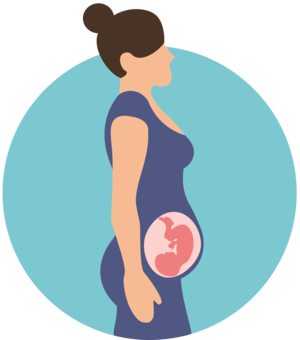Pregnancy at week 33
4-minute read
Your baby
Your baby is gaining a lot of weight, ready to be born. They weigh about 1.9kg now. Their lungs are maturing and they are producing surfactant, which means they will be able to breathe by themselves outside the uterus.
The baby’s brain and nervous system are now fully developed. They can suck and swallow, although these reflexes won’t be coordinated properly for another week or so. They are storing iron in their liver, which they will use for about 6 months after they are born.
Your baby at 33 weeks
| Length: | 29cm (head to bottom) |
| Weight: | 1.9kg |

Your body
As you get closer to the end of your pregnancy, all your discomforts are likely to increase, including leg cramps, backache, indigestion and heartburn and swelling of your feet and legs. Contact your doctor or midwife straight away if the swelling suddenly gets much worse, if you have it first thing in the morning, or if your face or hands are swollen.
The weight of the baby can also cause bladder and bowel problems, including haemorrhoids, frequent urination or incontinence (when you leak some urine). It’s a very good idea to do pelvic floor exercises every day from now on. These will strengthen your muscles and improve your bladder and bowel control.
Things to remember
The larger your baby grows, the more squashed into your uterus they become. This can affect their movements. You might be able to feel limbs poking you at all sorts of odd angles.
You will probably be getting familiar with your baby’s pattern of movements. They may be very active at certain times (often during the night, when you’re trying to sleep), and still when you’re moving around during the day.
Some women might not feel many movements, for example, if they have a lot of tummy fat or if the placenta is on the front wall of the uterus. But if you notice any sudden changes in what is normal for your baby, or if they stop moving altogether, talk to your doctor or midwife urgently.
Read next

Your pregnancy at 34 weeks
Learn about your pregnancy journey and what is happening to you and your baby.

Speak to a maternal child health nurse
Call Pregnancy, Birth and Baby to speak to a maternal child health nurse on 1800 882 436 or video call. Available 7am to midnight (AET), 7 days a week.
Learn more here about the development and quality assurance of healthdirect content.
Last reviewed: August 2020

